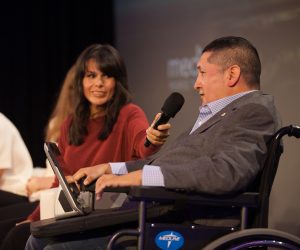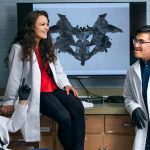“The right thing to do is to tell others my story”
Earlier this month, Eric Amador sat in his power wheelchair, facing a group of legislators and legislative aides. His wife, Toni, was at his side.
Diagnosed with amyotrophic lateral sclerosis two and a half years ago, Amador has lost his ability to walk and speak. But, that hasn’t stopped him from visiting Congress on three separate occasions to share his story and advocate for change. He wants his representatives to see the face of a real person who is battling the disease.
Eric and Toni Amador in Washington DC on May 13, 2017
Speaking at Medicine X 2016, husband and wife Eric and Toni Amador share their experiences struggling to receive care after Eric was diagnosed with ALS. Their talk is preceded by a screening of a film about Eric’s experience adapting to life with ALS.
With the help of a speech-generating device on his most recent visit, he asked those assembled to pledge their support for waiving a five-month waiting period for disability benefits, preserving access to important power wheelchair accessories and removing barriers to home health services.
“As an ALS advocate we are here to fight for those who cannot fight for themselves,” he said. “Also speak out for those who cannot speak.”
ALS – also known as Lou Gehrig’s disease – is a progressive neurodegenerative disease that eventually impedes muscle movement and leads to paralysis and death. Members of the military develop the disease at twice the rate of the rest of the population. Most people live just two to five years after diagnosis. There is no cure.
Amador, a 26-year Navy veteran, served four tours in the Persian Gulf before taking a job as a White House executive chef under Presidents Bush and Obama.
In the spring of 2014, he began noticing little changes: His hands locked up when he chopped vegetables. When he tried to pick up the laundry, it slipped from his fingers.
Then, on Oct. 14, 2014, he called his wife, Toni, from work. He had an excruciating headache, he told her. Thinking he was having a stroke, she urged him to rush to the hospital.
After a series of tests, the neurologist sat him down and offered a death sentence. Eric didn’t even know what ALS was.
“You mean the Ice Bucket Challenge?” he asked, recalling the videos of the fundraiser for the disease he’d seen going around Facebook.
The neurologist handed him a business card. No pamphlets. No brochures. No next steps.
“If you need to speak to a chaplain,” the doctor said, “here’s my number.”
Devastated, Eric went home and cried. He and Toni tried to figure out how to deliver the news to their three children. A few days later, as his new reality sank in, Amador got angry. And he and Toni started researching.
They reached out to support groups, where members explained the many therapies and equipment Amador would need.
Amador has been honored as a Central Valley Hero by the ALS Association, and has received awards for his advocacy at the national level.
“What’s the right thing to do is to tell others my story,” he says. “We are fighting for others, so that they don’t have to go through this process.”
ABOUT MEDICINE X | CITIZEN: To be a #medx citizen is to have a voice, no matter who you are. CITIZEN aims to be a guide to the people and action in the Medicine X community that are shaping the evolving health care conversation. Entries in this series are not an endorsement of the people or actions featured.








